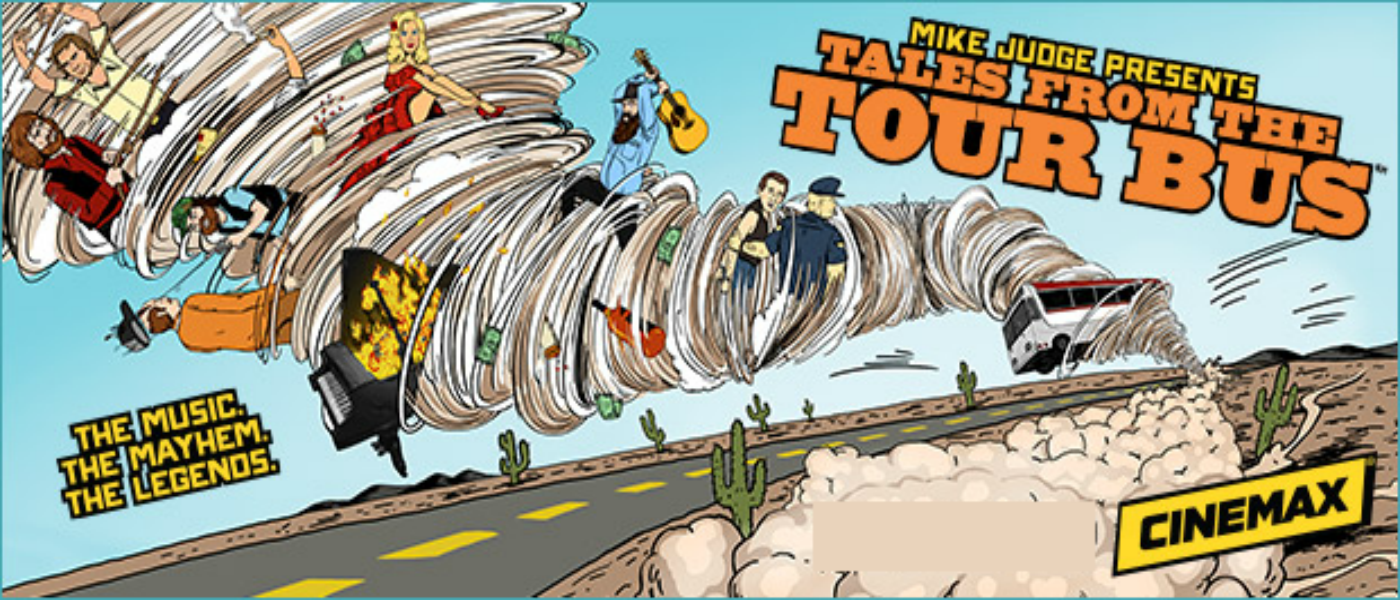Review: Mike Judge Presents Tales from the Tour Bus “Blaze Foley”
Going out in the blaze of Foley.
OVERVIEW (SPOILERS, FOR REAL THIS TIME)
We check in with cartoon Mike Judge one last time as we summarize what figures we’ve covered in the show so far; Outlaws who broke away from the standards and practices of the music industry and plain old manners to boot. But instead of only covering the popular and seemingly obvious choices, he decides that this season should end on someone who embodied the outlaw but couldn’t rise to the same level of notoriety. Remember this name: Blaze Foley.
Hank Sinatra (no relation) and Chuck Lamb note Blaze as “the nicest asshole you’ll ever meet”, though this wasn’t something you’d get just from looking at him. Though all these fears and assumptions washed away once you heard him sing and play. Gurf Morlix (who Judge describes has “maybe the greatest name in country music history” but whether this is referring to his talent or just his admittedly awesome sounding name is debatable), recalls getting hassled by Blaze between shows to get sold a guitar that wasn’t even his. Goes without saying that Blaze’s early musical career was its own distinct brand of silly.
Coming up from Malvern, Arkansas, Blaze (Michael Fuller as he was previously known) used to be a pretty heavy set kid who would introduce himself onstage as Deputy Dawg. Sometime after, in the mid 70’s, he’d meet Sibyl Rosen, who would be his lover, and committed to the name Blaze Foley, which he got from country legend Red Foley and Blaze Starr. And while he traumatized Sybil’s parents upon meeting them, his musical spirit shone through and won them over in the end.
Harold Eggers became tasked with the seemingly impossible, that being finding an agreeable record deal for Blaze. This wasn’t helped by his association with the one-time meth maker Leland Waddell. We comb through a live action interview of a vibrant and possibly hopped up Waddell from 2002 raving about his find of the dealing business before cutting to, ironically, a more animated but less energetic version in present day, telling us of how they helped one Townes Van Zandt find a good grave (not that he would need one for another decade and a half after that day). Blaze said they did alright.
Though this didn’t help Blaze much in the living department, as he mainly jumped around couches and bars, and eventually a car that later got totaled. Local DJ Larry Monroe remembers him sleeping underneath a pool table, which also didn’t exactly help make the best of first impressions with people. Though he was exceptionally thrifty, almost legendary, regarding his use of duct tape as a response to the more glossy fashion, which started popping up thanks to the movie “Urban Cowboy”.
This arguably ahead of its time sense of aesthetics couldn’t land him a record deal, however. Not that Blaze was particularly interested becoming part of the industry and all of its restrictions, given his outlaw tendencies. But through all of the struggling came his signature piece: “If I Could Only Fly”. Sibyl tearfully recalls interpreting it as a lament, and yet also an acceptance, of Blaze’s rootlessness and drifting.
Blaze used this newfound notoriety in the best way he knew how: singing a song about a Ugandan dictator eating people at a club where even swearing would get you kicked out. Naturally, he was banned for life but tried in many a Looney Tunes fashion to sneak back in over and over.
Things started looking up for Blaze. He had his song covered by Merle Haggard, got a royalty check, rented a room in an actual honest to goodness house. But sadly, just as things seemed to be turning around, he was shot and killed early 1989. A duct tape christened coffin was lowered into the ground and the man who wished he could fly, finally did.
OUR TAKE
Given all the focus on Outlaw Country in the past couple episodes, ending on Waylon Jennings seemed like the logical choice. However, given the nature of this series seems to be giving people knowledge of a genre they may not be very familiar with, closing out with an unappreciated gem makes just a bit more sense. Blaze’s story is as brilliant as it is tragic and certainly just as poignant, even if it’s about someone not as prolific as Jennings or Lewis. It’s just as jammed packed of key events, but also just as important to truly understand the hidden greats of the industry.
But all good things must come to an end, at least for now. Next week, an overview of this experiment and how much it succeeded and failed, as well as what could be improved.

























I'm hired!